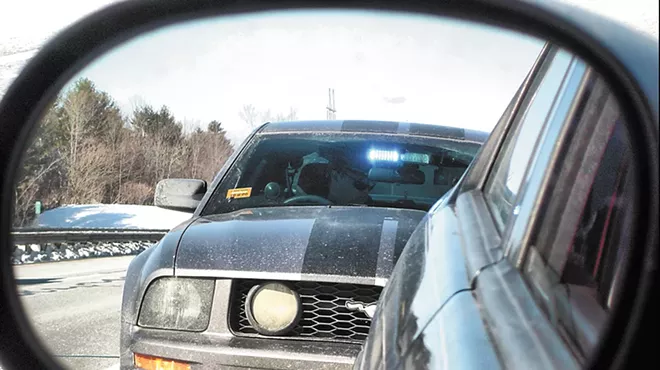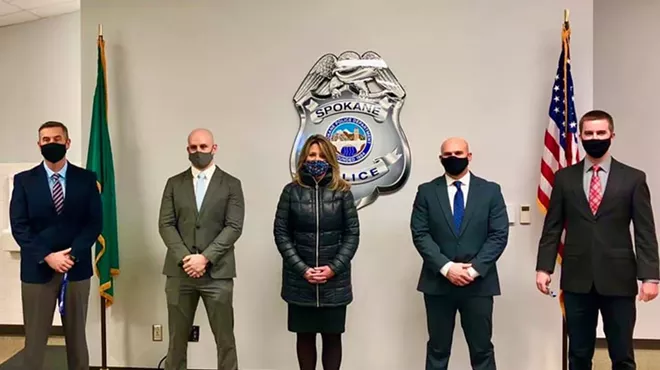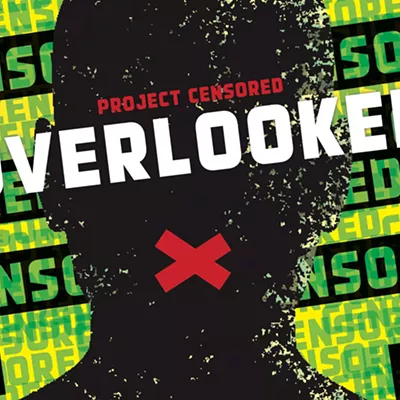
In mid-July, Oregon Public Broadcasting broke a particularly outrageous story: Federal law enforcement officers were driving around Portland, sweeping up protesters in unmarked vehicles, refusing to tell the protesters who they were, which agency they were with, or what they were being arrested for. By August, the practice had become a part of a federal congressional hearing.
After last Sunday's protests in Spokane, Jeremy Logan, Spokane's co-chair of the Democratic Socialists of America and a vocal critic of the police, alleged that something similar happened to him.
A Huffington Post article laid out Logan's claims that while walking to Sunday's protest, he was apprehended by six men in plain clothes, at least one of whom was armed. They threw him in the back of an unmarked silver Dodge Caravan, telling him had an outstanding warrant and was under arrest. But the men, according to Logan, repeatedly refused to identify themselves, never showed a badge, and gave various contradictory answers about which county the warrant was from.
The men — he says he only later learned they were sheriff's deputies — handed him off to Spokane police officers, who brought him to the Spokane County Jail.
Now the Spokane County Sheriff's Office strongly disputes the accuracy of Logan's claims.
Instead, the issue pivots on two critical questions: First, did the sheriff's office swoop in in plain clothes and refuse to tell Logan who they were? And second, did the sheriff's office only choose now to arrest Logan because of his "All Cops Are Bastards" rhetoric and his support of Black Lives Matter?
Let's take each issue separately.
DID THE SHERIFF'S DEPUTIES PROPERLY IDENTIFY THEMSELVES?
In an interview with the Inlander, Logan reiterates that he didn't see the plainclothes deputies wearing any badges or displaying any sort of identification.
He says he worries that these kinds of plainclothes arrest tactics could open up the floodgates to allow right-wing militants to kidnap protesters by pretending to be plainclothes officers.
He says that according to the deputies who'd made the arrest, they verbally identified themselves as being from the sheriff's office, told him he was under arrest, and said that one of the deputies making the arrest had a badge "hanging on a chain around his neck" and that another had a vest with identification on it. He accuses Logan of "intentionally trying to stoke a response."
"I was like, 'Who the hell are you, what’s going on?'” Neville says. “They never said anything. ... I felt powerless.”
Neville says he didn't see any of the deputies wearing a badge around their neck, but did see "one of those little police badge things" on the front of the vest one of the deputies was wearing.
Still, he says it wasn't clear which agency was identified on the vest, and says that "it seemed like some makeshift one that you could buy from a surplus store that says you’re police."
He does say that Logan appeared to know why he was being arrested, telling Neville that it was "for fines."
Logan says that after the deputies arrested him, they brought him to a Spokane police officer, who took him to jail. He says the officer confirmed to him he had been arrested by law enforcement officers but when he asked "what kind of officers were those?" he said "I don't know."
But Preuninger says the officer just meant that he didn't personally know the names of the sheriff's deputies. He further claims that, after watching the body camera footage, there was nothing to suggest that Logan was freaked out by the incident.
"There is no sense in his voice of panic or that he doesn’t know what’s going on,"
He acknowledges that there are people critical of the use of plainclothes officers, but he defends the tactic.
"There are groups that do not like the fact that we have plainclothes capability. We accomplish so much work in our community for a plainclothes' capacity," says Preuninger. "I have been a very sneaky police officer. And have put a lot of terrible people in prison by being sneaky."
But other times, the use of plainclothes officers or unmarked cars can end in tragedy.
In 2010, Spokane Valley Rev. Wayne Scott Creach brought his handgun to check on a car parked on private property. It turned out the car was an unmarked sheriff's deputy vehicle, and Creach was shot and killed in the resulting confrontation.
Logan worries that this incident could have ended the same way if he were less peaceful.
WHY WAS LOGAN TO BE ARRESTED NOW?
Logan knew he had a Douglas County warrant out for his arrest. He says he had leftover probationary fines after his conviction for possession of heroin.
"They said that wasn't enough, and that they would issue a warrant," Logan says. "I said, 'I guess you'll have to issue a warrant.'"
In fact, Logan says he'd been pulled over twice in Spokane County, once by a sheriff's deputy and once by an SPD officer, and was told that he had a warrant out for his arrest. But he says that Douglas County didn't want to go to the hassle of bringing him all the way to the county to jail him for a fine.
He suggests it was retaliation, maybe for his comments about "antifa" in a July Inlander article.
He says they looked up his warrant status, not because of his political activism, but because he'd made "threatening comments toward law enforcement" online.
Normally, it would be easy to comb through Logan's social media history to see if he'd said anything threatening.
"I didn't want to deal with people that I used to know, that I used to be friends with, telling me I'm a piece of shit so that they can defend the police," Logan says.
Logan says a lot of derisive things about cops.
"I talk about pigs all the time. They are pigs," Logan told the Inlander. "And Sheriff Ozzie is this biggest clown-pig of them all."
But he initially scoffed at the idea that he'd said anything about doing violence to pigs.
"Cutting the heads off of pigs?" Logan said. "No, I don't recall anything like that ... Never anything about slaughtering pigs or anything."
He says he never had the intention of making any sort of threats toward police officers.
"If you wanted to purposely misinterpret a joke or something, then I don't know. You would have to reach to find an actual threat," Logan says. "I've shared posts of riot footage where police officers have been knocked down or where people are making fun of them or that sort of thing... But when you compare that to the violence they commit, it's absurd."
But after the Inlander repeatedly pressed the sheriff's office on what Logan's comments were, Gregory sent over an image with two screenshots. One included a Facebook comment from Logan on June 29, writing about how he wants to "take these pigs' heads off with a hand saw."
Gregory says that the comments were non-specific enough to be protected under the First Amendment, despite their violent nature. Still, it was a reason for law enforcement to look into his background, and that's where they found the old warrant for his arrest. He says Spokane County Sheriff Ozzie Knezovich plans to provide additional context around this issue on Tuesday.
When confronted by the Inlander about the screenshot, Logan admitted he'd written it.
He says the comments had been triggered by viewing footage of police violence after some of the George Floyd protests.
Today, he says he believes that "destruction of property has been a useful tactic" and argues that rioting is defensible, even if it's not always the best option.
Still, he makes a distinction between defending actions and endorsing them.
But what about out-and-out violence? Does he believe that it's justifiable to, say, throw rocks at police officers?
Only in self-defense, he says. If the cops are swinging their batons or attacking protesters, he believes turnabout is fair play.
Still, Logan stresses that he personally wouldn't use destructive or violent tactics during protests.
"I personally am never going to destroy property," he says. "I'm a 40-year-old man who has a painting business."
Logan argues that the way he was arrested was clearly meant to intimidate him.
And indeed, when the Inlander spoke with Logan, he expressed concerns about being watched, saying he'd seen men in black vans on his street this morning.



























